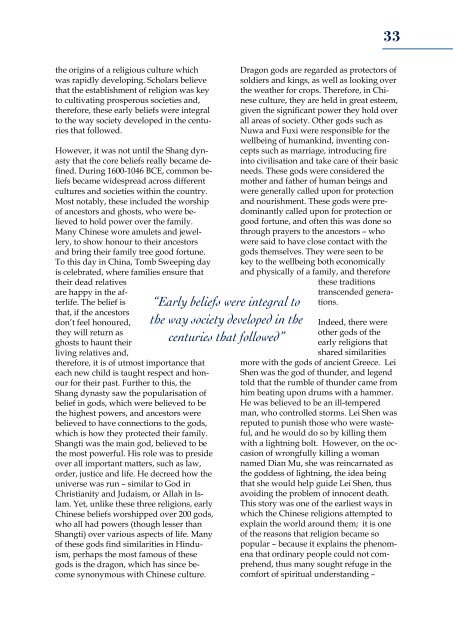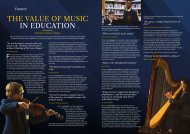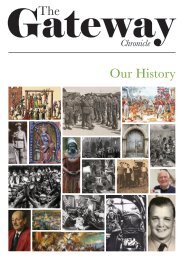Create successful ePaper yourself
Turn your PDF publications into a flip-book with our unique Google optimized e-Paper software.
33<br />
the origins of a religious culture which<br />
was rapidly developing. Scholars believe<br />
that the establishment of religion was key<br />
to cultivating prosperous societies and,<br />
therefore, these early beliefs were integral<br />
to the way society developed in the centuries<br />
that followed.<br />
However, it was not until the Shang dynasty<br />
that the core beliefs really became defined.<br />
During 1600-1046 BCE, common beliefs<br />
became widespread across different<br />
cultures and societies within the country.<br />
Most notably, these included the worship<br />
of ancestors and ghosts, who were believed<br />
to hold power over the family.<br />
Many Chinese wore amulets and jewellery,<br />
to show honour to their ancestors<br />
and bring their family tree good fortune.<br />
To this day in China, Tomb Sweeping day<br />
is celebrated, where families ensure that<br />
their dead relatives<br />
are happy in the afterlife.<br />
<strong>The</strong> belief is<br />
that, if the ancestors<br />
don’t feel honoured,<br />
they will return as<br />
ghosts to haunt their<br />
living relatives and,<br />
therefore, it is of utmost importance that<br />
each new child is taught respect and honour<br />
for their past. Further to this, the<br />
Shang dynasty saw the popularisation of<br />
belief in gods, which were believed to be<br />
the highest powers, and ancestors were<br />
believed to have connections to the gods,<br />
which is how they protected their family.<br />
Shangti was the main god, believed to be<br />
the most powerful. His role was to preside<br />
over all important matters, such as law,<br />
order, justice and life. He decreed how the<br />
universe was run – similar to God in<br />
Christianity and Judaism, or Allah in Islam.<br />
Yet, unlike these three religions, early<br />
Chinese beliefs worshipped over 200 gods,<br />
who all had powers (though lesser than<br />
Shangti) over various aspects of life. Many<br />
of these gods find similarities in Hinduism,<br />
perhaps the most famous of these<br />
gods is the dragon, which has since become<br />
synonymous with Chinese culture.<br />
“Early beliefs were integral to<br />
the way society developed in the<br />
centuries that followed”<br />
Dragon gods are regarded as protectors of<br />
soldiers and kings, as well as looking over<br />
the weather for crops. <strong>The</strong>refore, in Chinese<br />
culture, they are held in great esteem,<br />
given the significant power they hold over<br />
all areas of society. Other gods such as<br />
Nuwa and Fuxi were responsible for the<br />
wellbeing of humankind, inventing concepts<br />
such as marriage, introducing fire<br />
into civilisation and take care of their basic<br />
needs. <strong>The</strong>se gods were considered the<br />
mother and father of human beings and<br />
were generally called upon for protection<br />
and nourishment. <strong>The</strong>se gods were predominantly<br />
called upon for protection or<br />
good fortune, and often this was done so<br />
through prayers to the ancestors – who<br />
were said to have close contact with the<br />
gods themselves. <strong>The</strong>y were seen to be<br />
key to the wellbeing both economically<br />
and physically of a family, and therefore<br />
these traditions<br />
transcended generations.<br />
Indeed, there were<br />
other gods of the<br />
early religions that<br />
shared similarities<br />
more with the gods of ancient Greece. Lei<br />
Shen was the god of thunder, and legend<br />
told that the rumble of thunder came from<br />
him beating upon drums with a hammer.<br />
He was believed to be an ill-tempered<br />
man, who controlled storms. Lei Shen was<br />
reputed to punish those who were wasteful,<br />
and he would do so by killing them<br />
with a lightning bolt. However, on the occasion<br />
of wrongfully killing a woman<br />
named Dian Mu, she was reincarnated as<br />
the goddess of lightning, the idea being<br />
that she would help guide Lei Shen, thus<br />
avoiding the problem of innocent death.<br />
This story was one of the earliest ways in<br />
which the Chinese religions attempted to<br />
explain the world around them; it is one<br />
of the reasons that religion became so<br />
popular – because it explains the phenomena<br />
that ordinary people could not comprehend,<br />
thus many sought refuge in the<br />
comfort of spiritual understanding –


















